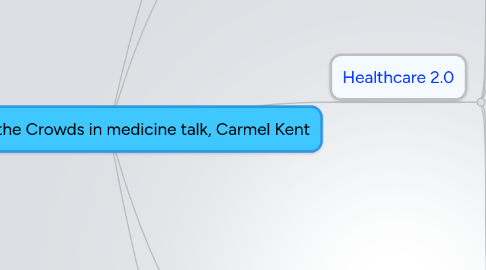
1. Healthcare 1.0
1.1. patient-provider dialogue is based on compliance
1.2. patients don't have their own records
1.3. only considerations are pysicians knowledge & tools
2. changes
2.1. Acute diseases become chronic
2.2. Patients become older
2.3. More data & knowledge compressed into few minutes of visit
2.4. The partnership paradigm
2.4.1. proffessionals are experts about diseases
2.4.2. patients are experts about their own lives
2.5. The web &c
3. Healthcare 2.0
3.1. The patient as a source for data & knowledge
3.1.1. The power of lots of data
3.1.1.1. from Clinical trials to Observational studies
3.1.1.2. The era of orphan diseases
3.1.2. Public health
3.1.3. PHR vs EHR
3.2. example
3.2.1. PatientsLikeMe web sites
3.2.1.1. WedMD
3.2.1.2. Forbes
3.2.1.3. כמוני
3.2.2. network graph showing correlations of diseases & symptoms for detecting drugs side effects
3.3. The patient is informed decision maker
3.3.1. Participation in online communities
3.3.2. Medical decisions making cognitive biases
3.4. The competing proponents
3.4.1. ePatiend Dave
3.4.1.1. "Gimme my damn data"
3.4.1.2. diagnised with terminal cancer
3.4.1.3. found a solution in forums
3.4.1.4. promotes patient empowerment
3.4.2. Dr. Lorie (Haus)
3.5. Problems
3.5.1. patients have wrong conceptions
3.5.2. privacy
3.5.3. evidence quality
3.5.4. Patien similarity: how many Swarms?
4. Healthcare 3.0
4.1. We need to meaningfully interconnect people & content
4.1.1. Personalization
4.1.2. Globalization
4.1.3. ...
4.2. Semantic Web
4.2.1. TBL: "Stop hugging your data!"
4.2.2. From web of unstructured text to Web of Objects & Data
4.2.2.1. Enable us to integrate, make inferences & leverage data into knowledge & wisdom
4.2.3. Linked Data
4.2.3.1. graph of ontologies
4.2.3.1.1. area of Life Sciences ontologies
4.3. Semantics
4.3.1. Objectification
4.3.2. Reasoning
4.3.3. Augmented search
4.3.4. ...
4.4. Semantic Wikis
4.4.1. Use the Wiki philosophy to build structured knowledge that can be more easily queried
4.4.2. Examples
4.4.2.1. BiomedGT
4.4.2.1.1. structured knowledge base of symptoms & diseases
4.4.2.2. nycfacets
4.4.2.2.1. integrated ontologies on NYC
